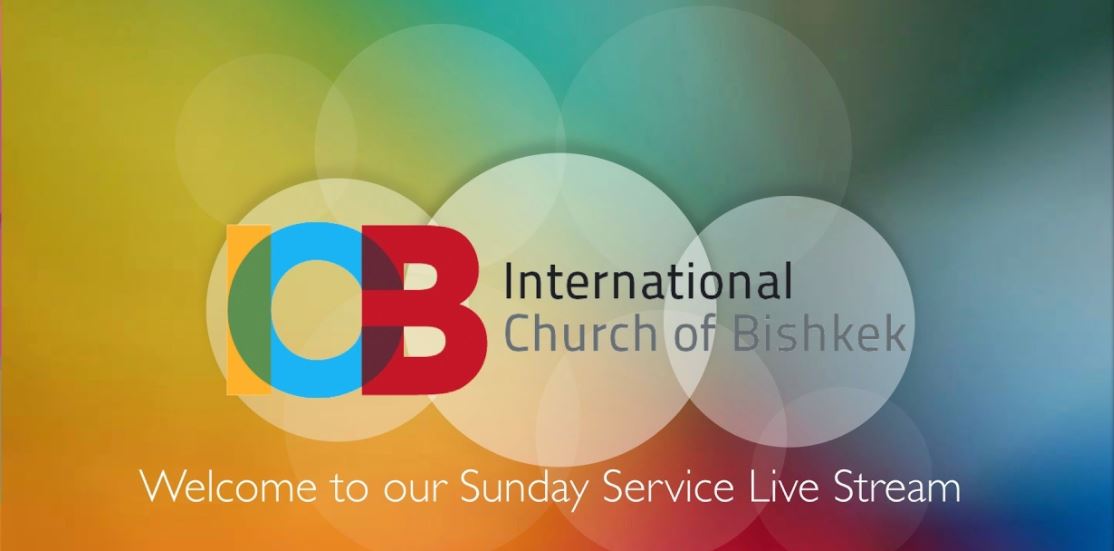And great fear came upon the whole church and upon all who heard of these things. Acts 5:11, ESV On Sunday we were challenged not to take God's holiness lightly. In this Second Look article, we'll take a look at our motivation for the pursuit of being holy as God is holy. Dear ICB family, Imagine a king adopts a beggar boy from the street. The king by his sovereign right makes the boy his son and brings him into his house. It is on the basis of the fact that the boy has already become a son of the king that the king expects the son to begin replacing the habits of his former life with habits that befit a prince. At no point is the boy striving to become a son of the king. The king has already given the boy his word to care for him as his son, and good kings never break their word. At the same time, precisely because the king has made the boy his son, the king will most certainly set about to conform the boy into the image of his new destiny: a prince fit for the king's palace. It will take a lot of time and effort. The king knew that going in. Undoubtedly the boy will often revert to habits that were ingrained into him on the streets. The king is very patient. The boy will fail, embarrass the rest of the royal family, make messes, rebel against the king's good rules for his household, not understand how to play nicely with his new brothers and sisters, and not act very regal on many occasions. It's a good thing the king is more committed to his son's good than the son is. Though it's true that the boy is not expected to live in such a way so as to become the king's son, it is also true that the reformation of the boy is not optional. Had it been optional, from the king's point of view he never would have adopted the boy in the first place. The boy was adopted, made a son, and given all the rights and privileges associated with his royal title in order to be made into an honorable prince. In like fashion, the consistent message of the New Testament is that God's children are called to be holy precisely because they already are God's children.* For example, Ephesians 1:4 says, "[God] chose us in him before the foundation of the world, that we should be holy and blameless before him" (ESV, emphasis added). The very reason God makes people his children is so that they would be holy and blameless before him. That's his goal for them in their salvation. Follow Paul's train of thought through the rest of Ephesians for a moment: You have been blessed with every spiritual blessing in heavenly places (1:3). You were chosen to be holy and blameless before him, predestined for adoption, and given redemption through his blood (1:4–10). You've obtained an inheritance and were sealed with the Holy Spirit (1:11–14). Paul prays that believers' eyes would be opened to all that they've been given in Christ (1:15-23). Next he describes how the Gentiles were made "fellow citizens with the saints and members of the household of God" (2:19), meaning, even if you're a Gentile, you're not second class citizen, and God has given you all the very same blessings of Israel (see 2:1-3:13). Next he prays again that the believers would be able to grasp the unfathomable love with which Christ loves his people (3:14–20). After describing who we are as believers in some of the most magnificent terms that we could ever imagine, what is the very next thing Paul says? "I therefore, a prisoner for the Lord, urge you to walk in a manner worthy of the calling to which you have been called" (4:1, emphasis mine). In other words, you've been made a child of the king! You've been sealed with the Spirit! You've been granted all the privileges of a son or daughter of Israel! Therefore, on the very basis of that fact, go live like it! Perceiving the Christian life in these terms guards us against two false views. First, it keeps us from thinking that we're striving to progress in holiness in order to become children of God. To think that is to put the cart before the horse and expect to get somewhere. Second, it also prevents us from thinking that holiness is optional in the Christian life. It is not optional. It's expected of us. It's commanded of us. It's the end goal God had in mind when he made you his child in the first place. Holiness is the only natural result of having been made a son or daughter of God. Therefore, be holy. Longing for holiness with you, dear brothers and sisters, Eric *For more examples of this very same logic at work, see 2 Peter 1:3–11, Galatians 5:1, and Romans 12:1–2, to name a few. In the case of Galatians and Romans, note the entire thrust of Paul's argument up to that point in the letter, and then notice how he uses his previous arguments as the grounds upon which he gives the command to live holy lives, very similarly to what he does in the example from Ephesians.
0 Comments
Click on the picture above to watch the message on our YouTube channel. acts 4:32-5:11Lying and deception was at the heart of Ananias and Sapphira's crime.
What is it that God really cares about?
Questions for personal reflection or group discussion
"[I]n this city there were gathered together against your holy servant Jesus, whom you anointed, both Herod and Pontius Pilate, along with the Gentiles and the peoples of Israel, to do whatever your hand and your plan had predestined to take place" (Acts 4:27-28, ESV). Dear ICB family,
Do we see events as these early believers in Acts saw them? Having just witnessed the crucifixion of Jesus, would we be capable of uttering such a prayer? Really? Herod and Pontius Pilate and the Romans soldiers and the Sanhedrin only did "whatever your hand and your plan had predestined to take place"? There could be no more heinous sin than what was committed against the Son of God. The righteous, innocent, pure, infinitely valuable, beautiful, blameless, and spotless Lamb had his throat slit by a group of cowardly, base, self-righteous, corrupt, and demon-possessed fopdoodles not worthy to lick the bottom of his sandal, yet alone to stoop down and untie it. And that, the most horrendous sin that mankind has ever committed (I say mankind because we all have blood on our hands here) only happened according to what God's hand and plan had purposefully and intentionally predestined to take place. I'm not even entering into the question of man's free will versus God's sovereignty here. There is room for a whole lot of mystery on that front. I'm simply restating what the text clearly asserts, and the plain fact of the matter is that God planned the unjust arrest, the self-protecting flight of the disciples, the unplumbed depths of loneliness, the shady trial, the bogus allegations, the humiliating taunts, the uncalled for beating, the excruciating flogging, the crown of thorns, the cold nails, the wooden cross, the heart-wrenching shame, and the unwarranted death of the Son of God that he might take away the sins of the world. Herod? Pilate? The Roman soldiers? The religious elite and the crowds of Israelites? They played their parts. They'll answer for their deeds. But they only got as far as they did because that was part of God's unassailable plan to save your soul and mine. We often quote Romans 8:28 ("And we know that for those who love God all things work together for good") and paraphrase the verse to mean that God takes whatever happens and somehow manages to bring good out of it. Now, I don't think it's wrong to paraphrase the verse that way. However, if Acts 4:27 is true, then we can also say that God not only turns bad situations into good ones; he also plans bad situations—even the worst, like the crucifixion of the Son of God—in order to bring about good. And that is a slightly different perspective, isn't it? I can feel myself recoil at the thought. God plans my pain? And then the Spirit whispers Romans 9:20 to my indignant, fearful heart: "[W]ho are you, O man, to answer back to God?" Followed by Job 2:10: "Shall we receive good from God, and shall we not receive evil?" And by the time he whispers Hebrews 12:5-11—"'My son, do not regard lightly the discipline of the Lord, nor be weary when reproved by him. For the Lord disciplines the one he loves, and chastises every son whom he receives.' It is for discipline that you have to endure. God is treating you as sons.... [H]e disciplines us for our good, that we may share his holiness. For the moment all discipline seems painful rather than pleasant, but later it yields the peaceful fruit of righteousness to those who have been trained by it"—I feel my heartrate slow, my shoulders relax, and my racing mind calm, and finally I'm able to surrender to the good, high, and holy will of my loving Father who owes me no explanations but simply asks me to trust that he's got this in his hands, too. Yes, he's planned even the pain, but just like a good coach pushes his athletes to their breaking points and even beyond, God trains us through suffering so that we'll share in his holiness, the very thing that satisfies the soul like no other. This, God's holiness wrought in us, is the "eternal weight of glory beyond all comparison" that "this slight momentary affliction is preparing for us" (2 Corinthians 4:17). May confidence in such glory cause you to "lift your drooping hands and strengthen your weak knees" (Hebrews 12:12). He's planned this, meaning it has a purpose—your holiness!—and his purposes for you, beloved son or daughter of God, are better than any purposes you might be able to think up for yourself. Praying for grace to be able to pray in tune with the believers in Acts 4:27, Eric Click on the picture above to watch the sermon on our YouTube channel. Acts 4:1-31A church filled with the Holy Spirit…
Questions for personal reflection or group discussion:
"And they devoted themselves to the apostles' teaching and fellowship, to the breaking of bread and the prayers" (Acts 2:42, ESV). Acts 2:42 mentions four things to which members of the early church devoted themselves: the apostles' teaching, fellowship, the breaking of bread, and prayers. The word devote is a strong word. A person is devoted to the things to which he gives most or all of his time, resources, energy, and attention.
In certain instances, the word devote can mean "to be set apart," much like we use the word consecrate or dedicate. For example, a place can be devoted (set apart, consecrated, dedicated) to the worship of God, meaning that that place exists for the sole purpose of worshiping God. It has no other use. With that in mind, then, to say that members of the early church devoted themselves to the word, fellowship, breaking bread, and prayers is quite a statement. And one of the things for which the church from the very beginning set itself apart was fellowship. It's not a word we use all that much outside the context of the Bible or church. For me growing up, fellowship was a potluck meal we had after the Sunday evening service every so often. Somehow Merriam and Webster still haven't gotten around to including that definition. The ones they do provide, however, include "companionship," "company," "the state of being a fellow or associate," and "a company of equals or friends." When you're sitting in someone's living room or around the dining room table with a group of friends and you are considered part of the group—you're "in"—that's fellowship. At the face of it, that sounds like a rather strange thing to devote oneself to. Oh sure, you'd expect "devotion to the apostles' teaching" to make the list. But to say that the early church spent large amounts of time, energy, and resources into bringing people together and creating an atmosphere in which they all felt like equal members of the family? It's stunning and beautiful all at the same time. It's a reflection of the heart of God that manifests itself in his children. Of course his children would devote themselves to such a thing when he has devoted himself to making a place at the table for people like you and me. If there was ever a time when people the world over needed the blessing of being brought in, included, and given a chair at the table in equal standing with everyone else gathered, it's now, and in light of who our Father is, we believers of all people should feel most devoted to it. As we grow in our devotion to the word, the breaking of bread, and prayer, may we also grow in our devotion to fellowship. Longing for you to find your place at the table, Eric Click on the picture above to watch the message on our YouTube channel. acts 2:42-47The early church devoted itself to these four things:
3 outcomes of their devotion:
Questions for Personal Reflection or Group Discussion:
"They saw what seemed to be tongues of fire that separated and came to rest on each of them. All of them were filled with the Holy Spirit" (Acts 2:3-4, NIV). Clouds and fire are both symbols of God's presence in the Old Testament. Exodus 13:21 says, "And the LORD went before them [the Israelites they were leaving Egypt] by day in a pillar of cloud to lead them along the way, and by night in a pillar of fire to give them light, that they might travel by day and by night" (ESV). Notice that it was God himself there in the cloud and in the fire. When the tabernacle was finally completed according to God's specifications, "the cloud covered the tent of meeting, and the glory of the Lord filled the tabernacle" (Exodus 40:34). God's glory filled the tabernacle because God's presence had come down to dwell among his people. A similar description is given in 1 Kings 8:10-11 when the first temple was built under the direction of Solomon: "a cloud filled the house of the Lord" and "the glory of the Lord filled the house of the Lord."
God had desired to live among his people since sin separated them from him in the Garden of Eden (Genesis 3), and with the construction of the tabernacle and then the permanent temple, we see him take a step closer. Yet notice two very interesting details about the account of God's filling the tabernacle in Exodus 40 and then God's filling the temple in 1 Kings 8. In Exodus 40:35 we read, "And Moses was not able to enter the tent of meeting because the cloud settled on it." Precisely because God's presence had descended to earth over the tabernacle, Moses wasn't able to go inside. In 1 Kings 8:10-11 it says, "And when the priests came out of the Holy Place, a cloud filled the house of the Lord, so that the priests could not stand to minister because of the cloud, for the glory of the Lord filled the house of the Lord." What happens when God comes near to his people? God's people must take a step back lest they be consumed. The prophet Ezekiel sees a vision of something truly tragic happening in Ezekiel 10: "Then the glory of the LORD went out from the threshold of the house [the temple]." The living God who dwelled among his people left as surely as he had come. And for hundreds of years, God no longer dwells presentially on earth with his people. The kingdoms represented by Daniel's visions arose and fell. The Romans finally claimed their seat on top. And in a backwater town called Bethlehem, the eternal Word of God became flesh and once more tabernacled among us. God's presence was back, but not in the form of a cloud or a pilar of fire. This time he had come in the flesh, so unmistakably so that John is able to say, "and we have seen his glory, glory as of the only Son from the Father, full of grace and truth" (John 1:14). What the Israelites saw in the tabernacle and then in the temple, namely, God's glory, John got to see in the person of Jesus Christ. But then, to our dismay, Jesus in bodily form ascended again into heaven after his crucifixion and resurrection. I would remain very sad about that fact had Jesus not given us this promise in John 16:6: "I tell you the truth: it is to your advantage that I go away, for if I do not go away, the Helper will not come to you. But if I go, I will send him to you." And then, and only then, came Pentecost, and something beyond the imagination of any human being actually happened. God once more came near. This time, however, he didn't come in a cloud or in fire. He didn't come bodily. His presence once more began to dwell among his people in the person of his Holy Spirit, as represented by small tongues of fire resting over the heads of those present in the upper room. Note it's the same presence; God himself is with us. Yet notice that there's no building associated with that presence like was true with the tabernacle and temple. Believers in Jesus, like "living stones," Peter says, "are being built up as a spiritual house" (1 Peter 2:5). We are the place where God's presence dwells on the earth, and that is no less miraculous than God's presence filling the tabernacle or the temple. When God's presence descended over the tabernacle and temple, people were forced to take a step back. When God's presence descended over his people on Pentecost, not only were they given full access to that presence (remember the veil of the temple had been ripped from top to bottom [Matthew 27:51]), they were the very places in which God's presence dwelled. And it was Jesus's act in which "upon him was the chastisement that brought us peace" (Isaiah 53:5) that allowed God's people to finally be able to dwell once more with God in peace. As dramatic as the descent of a cloud over the temple might be or as exciting as the resting of small flames of fire on the heads of believers gathered in the upper room might sound, we must not miss the reality for the sign. A cloud or fire are not God's presence. They are visible representations or signs of that presence. I would love to see God's glory appear to me in a cloud or in fire, yet if I get the reality without the sign, have I any right to feel shortchanged? Paul told the Ephesians, "[Y]ou also, when you heard the word of truth, the gospel of your salvation, and believed in him, were sealed with the promised Holy Spirit" (Ephesians 1:13), and to the Romans he said, "God's love has been poured into our hearts through the Holy Spirit who has been given to us" (Romans 5:5). If you, along with the Ephesians, have heard the word of truth and believed in him, the same presence of God that led the Israelites through the wilderness in the form of a cloud by day and fiery pilar by night, the same presence of God that descended on the tabernacle and temple in a glorious cloud, the same presence of God that Ezekiel saw leave the temple, the same presence of God that walked down dusty Galilean roads and ate roasted fish with his disciples, and the same presence of God that filled those first believers when fire came to rest on each one of them is none other than the very same presence of God that is with us today in the person of his indwelling Spirit. Feel the weight of that. The God in the cloud over the tabernacle in Exodus is the God who fills you with his presence right now. And that's better than merely seeing him descend over a building. It's like the difference between only being able to see God through binoculars from far away and being able to invite him right into the living room of your soul for coffee. God's presence, once a death sentence to mankind, has come to stay, and if you've believed in Jesus, you're a stone in his house. May the truth that God is so incredibly near to you overwhelm you with hope this week. Rejoicing with you for the hope that is ours because God is still with us, Eric Click on the picture above to watch the video on our YouTube channel. Genesis 11:1-9, Acts 2:1-13Three questions about Pentecost.
1. What is Pentecost? It's the reversal of the tower of Babel, that city connected with Babylon, representing mankind's rebellion against God. Here God is coming to live on earth in a new way (compare Exodus 40:34 with Acts 2:3). God establishing his dwelling among his people. 2. What does it mean? Peter explains in Acts 2:14-41. We see the clear communication of the truths of the gospel of Jesus Christ in all language to all people, signaling universally available salvation. Jesus, the main character of Pentecost, is the Lord, and God is doing a new thing. He's building his home inside us. 3. What should we do? Peter tells the crowds to do two things: repent and be baptized. This is how we receive and continue to enjoy the gift of salvation. Repentance is not a single event but an ongoing lifestyle. Baptism, immersion in water, is the sign of washing from sin and freedom from the slavery of sin. Questions for personal reflection or group discussion: 1. When you consider the fact that Pentecost signals the return of God's presence to once again dwell with his people and in his people, how does that impact you? 2. In what ways is God on the day of Pentecost fulfilling his Old Testament promises to carry out his grand plan of redemption? 3. In light of the fact that repentance is not a single event but instead an ongoing lifestyle, how might you need to repent today? "[Jesus] said to [his disciples]: 'It is not for you to know the times or dates the Father has set by his own authority" (Acts 1:7, NIV). Dear ICB family,
Jesus told his disciples in Acts 1 that it simply wasn't their business to know when God would restore the kingdom to Israel (verses 6-7). Such secret things belong to the Lord (Deuteronomy 29:29). And instead of answering the disciples' question, Jesus gives them a clear directive that, as Pastor Phil reminded us, is for us today, too: "[Y]ou will receive power when the Holy Spirit comes on you; and you will be my witnesses in Jerusalem, and in all Judea and Samaria, and to the ends of the earth.” At least for me, this was a stark reminder of the fact that God puts a higher premium on our obedience to his unambiguous commands than he does on our figuring out the great mysterious of the universe, and for a guy who likes to spend considerable time up in the clouds thinking about just such mysteries, such a reminder strikes me as both humbling and as a huge relief. It's humbling because I'm a servant who's been given orders by his Master. Servants obey. It's simply not our job to understand the Master's business dealings or his timetables for running his estate. He'll tend to all that just fine. And he'll do so whether I have the foggiest idea of his plans and methods for carrying out those plans or not. And it's a huge relief because it takes so much pressure off. God doesn't demand that his servants perfectly grasp the exact nature of the relationships between the members of the Trinity. He does, however, demand that we love him with all our beings and that we love our neighbor as ourselves. He doesn't demand that we fully comprehend how his sovereignty interacts with man's free will, but he does command us to stand as lights and witnesses of his power and his love to those around us. We don't have to have plumbed the deepest depths of the significance of the atonement of Christ on our behalf for us to very simply declare, with tears in our eyes, that Christ died so that we could come home to our heavenly Father. And even if we did understand "all mysteries and all knowledge" but failed to obey his command to love, we would be nothing (1 Corinthians 13:2). That means that despite all my unanswered questions, I can start living faithfully to my Master right now, and I can barely think of anything that I want more. Yes, it's true, the King James translation of 2 Timothy 2:15 reads "Study to shew thyself approved unto God, a workman that needeth not to be ashamed, rightly dividing the word of truth," and yes, loving God with all our beings includes loving God with all our minds, which at least means that we are to exercise every last mental muscle we've been given to know all that we can about the God whom we love. But any knowledge gained, any insight given, or any truth better understood is only worth something to the extent that it aids a person in being a more faithful servant. For example, we strain with all our mental might to better understand the nature of God as he's revealed himself in the pages of Scripture and ultimately in the person of his Son because the more we know about him the more about him there is for us to love and adore—that is, our knowledge of God aids us in being more obedient to the command to love him. And we labor with detailed precision to better understand Paul's arguments through the book of Romans, for example, so that we can sit down with another person and walk him or her through those same arguments so that his or her faith might be built up—that is, our understanding the Bible better helps us to obey God's command to love and build up other people. In the end, we will live every last one of our days on this earth straining to see "in a mirror dimly" (1 Corinthians 13:12, ESV). And remember that the guy who said that about himself and us was also the one who was "caught up to the third heaven" and who "heard things that cannot be told, which man may not utter" (2 Corinthians 12:2-4), meaning that our greatest, clearest glimpses of the glory of God this side of eternity are faint reflections in darkened rooms compared to what will one day be revealed to us. Until then, there's no need to fret about our limited, blurry vision. We have enough to be obedient to his clear and direct commands right now; we have the Holy Spirit after all, as this passage also reminds us! So as we look into this upcoming year and continue to wonder at the vastness of our great God and all those things about him and his plans that ultimately aren't any of our business, may our limited understanding not in any way impede our obedience to his clear and simple commands, specifically, from Acts 1, that we live our entire lives as Jesus's witnesses to the very last ends of the earth. Asking for grace along with you to continue witnessing even as I wonder, Eric Click on the picture above to watch the message on our YouTube channel. Acts 1:1-115 questions as we begin a new sermon series through the book of Acts:
1. What is the role of the book of Acts in the NT and in the Bible? The book of Acts introduces us to people whose lives are radically transformed by the power of the Holy Spirit who in turn share this good news with others so that their lives are similarly transformed. 2. What is the structure of the story of the book of Acts? There are three waves of expansion: The church in Jerusalem (Acts 1-7), the church in Judea and Samaria (Acts 8-12), the church to the ends of the earth (Acts 13-28). 3. Who wrote the book of Acts? Dr. Luke (Colossians 4:14), who wrote the Gospel of Luke He enters the story himself in Acts 16:11 when he begins saying "we." 4. How does the author begin volume 2 of his story of Jesus? It's a description of the 40 days between the resurrection and ascension of Jesus. The primary topic of conversation is the Kingdom of God. What is the Kingdom of God? It's a term that is used to describe human life in relationship to their Creator as God intended it to be. It is a Trinitarian conversation. Jesus the Son is teaching in the power of the Holy Spirit, who comes from God the Father. 5. How does Jesus call his followers to respond? Wait! Acts 1:4-5: Wait for the gift of the Holy Spirit. God's work in this world cannot be accomplished simply by human effort. Wonder! Deuteronomy 29:29: "The secret things belong to the Lord our God, but the things that are revealed belong to us and to our children forever, that we may do all the words of this law" (ESV). There are some things that are not for us to know. We stand in faith upon that which has been revealed to us and in wonder at those things that haven't, knowing that God has all things under his control. Witness! Acts 1:8: If you are a follower of Jesus, you are a witness to others of the transforming power and love of Jesus. Discussion Questions:
|
Archives
May 2024
Categories
All
|







 RSS Feed
RSS Feed